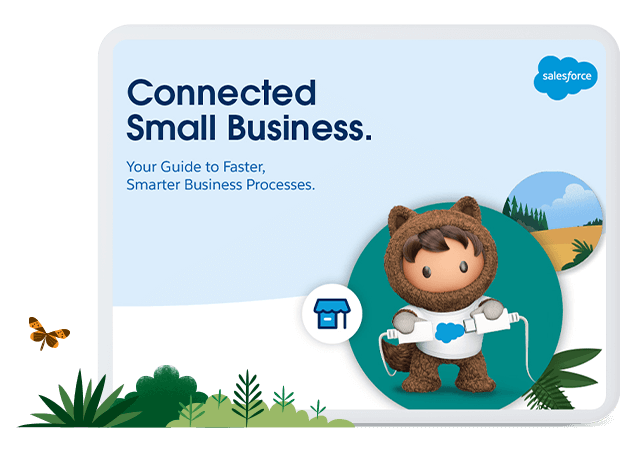Small business cyber security can often be overlooked, but it’s one of the most important things for organisations to get right. After all, if your company’s data is compromised, it can bring your business to a grinding halt. Even more concerning, if your customer’s data is put at risk, it may permanently damage your relationship – along with your business’s reputation.
But in a world where data is the new oil and more than 2.5 quintillion bytes of data are created every day, how can businesses unlock the power of data while still locking down on security?
Let’s have a look at why small business cyber security is such a pressing concern, and then see how organisations can protect their data and create trust with their customers.
Why is small business cyber security an important issue?
It may seem like big businesses should be the ones worried about sophisticated cyber-attacks, huge ransom demands and damaging data leaks, but you might be surprised to hear just how common cyber-attacks against small businesses are. There are an estimated 10,000 cyber-attacks against small businesses every day. These attacks cost small businesses £4.5 billion annually, with phishing attempts and malware being the most common cyber weapons.
The negative effects of cyber-attacks include:
Business disruption, leading to financial losses and a drain on resources.
Loss of customers and irreparable damage to a business’s reputation.
Financial outlays for customer compensation.
Confidential or high-value data that could fall into the hands of competitors.
The costs of ransomware payments.
Some small businesses may not be aware of the sheer scale of cyber dangers they face, and they may not be taking the necessary steps to protect themselves in the digital arena. Other businesses may not have the resources or budgets to address known security vulnerabilities, meaning that they keep their data under lock and key and can’t use it to properly drive business intelligence.
Cyber-security threats to watch out for
Cyber-criminals are constantly evolving, and their methods are growing more sophisticated. But despite the proliferation of new ‘dark’ tools like RDPs (Remote Desktop Protocols), spoofing tools and digital Trojan horses, one of the most common security threats is the most basic: human error.
Here are the top cyber-security threats that small businesses face today:
Human error.
Phishing attacks.
Malware and ransomware,
Passwords that are weak and easily guessable, or used across multiple accounts.
Fraudulent payment requests.
Malicious insiders.
6 tips for creating a better small business cyber security strategy
The good news? There are effective ways to combat these potentially devastating threats. And it all starts with going back to school.
Here are 6 tips for creating a new playbook for small business cyber security:
1. Skill up the workforce
An IBM report found that human error was involved in 95% of cyber-security breaches. Luckily, a bit of training can go a long way towards helping the workforce reduce errors, recognise threats and improve security protocols. Look at how on-demand training platforms can help you provide your workers with better tools for navigating the digital arena, and then create customer learning paths around your business’s cyber-security needs. As a bonus, you can use training platforms to address the digital skills gap prepare for the future of work.
2. Reduce shadow IT
Shadow IT refers to the use of unsanctioned third-party apps and personal devices (laptops, mobiles, tablets, etc) in the workplace. This is a prescient concern because these tools aren’t under the purview of the IT department – and aren’t under the same security protocols. Shadow IT has some positive benefits, as consumer technology can be user-friendly and increase productivity, but the security risks should be eliminated.
If you decide to ban third-party applications, consider creating similar tools by building your own no-code apps and keeping all data in-house.
3. Centralise your data management
Centralising your data management is one of the best and most impactful ways to not only improve security but optimise business processes. Data that is unstructured, siloed or free-floating can pose a security risk, and provide an incomplete picture of a business. When only 35% of business executives say they have a high level of trust in their data, it’s more important than ever to provide a 360-degree view of your business. Centralised data management can help.
4. Avoid phishing attacks
Phishing attacks have become incredibly common and increasingly sophisticated. Today’s cyber-criminals can use publicly accessible information, such as social media pages, to gather inside information about social circles, places visited and business partners. They can create website URLs and pages that look nearly identical to the real deal. And they can win the trust of an unsuspecting workforce with a simple phone call or email, claiming to be from a company they regularly do business with. Make sure that your workers are well trained in what to look out for, as the average employee is hit with 14 malicious emails per year. Even more concerning, an IBM report showed that 50% of victims clicked on Phishing attacks that included a Voice element.
5. Add multi-factor authentication
Multi-factor authentication can reduce many security risks, including ransomware and data theft. MFA is an easy and affordable way to improve cyber security for small businesses, as it only requires employees to have access to their mobiles. MFA’s benefits lay in the fact that a physical element is required for data access, which makes it impervious to brute force attacks and hacking.
6. Use cloud computing with auto updates
Keeping all your systems up to date is vital, but it can also be easy to let it slip. By using a cloud-computing solution, whether it be SaaS, PaaS or IaaS, you can benefit from automatic updates, constant backups and strong security protocols. This can empower your business to drive productivity, create a data-driven culture and fix any security vulnerabilities. Most cloud computing platforms can scale to match your security needs, so you can find solutions to guard your data for its entire lifecycle.
Are you ready to secure your future?
Unfortunately, small business cyber security isn’t an issue that can be addressed a single time before you move on to other concerns. As businesses adapt to current cyber threats, new threats will emerge. It will be a perpetual race between your organisation and malicious actors, with an incredibly valuable resource at the heart of the competition: your data.
Ensure that you stay a step ahead by keeping an eye open for threats. In order to minimise these threats, you’ll need to turbocharge your tech and train up the workforce. After all, the customer is putting their trust in you.
To see more about how you can connect business processes to improve security and drive business intelligence, check out our free eBook, The Connected Small Business.






